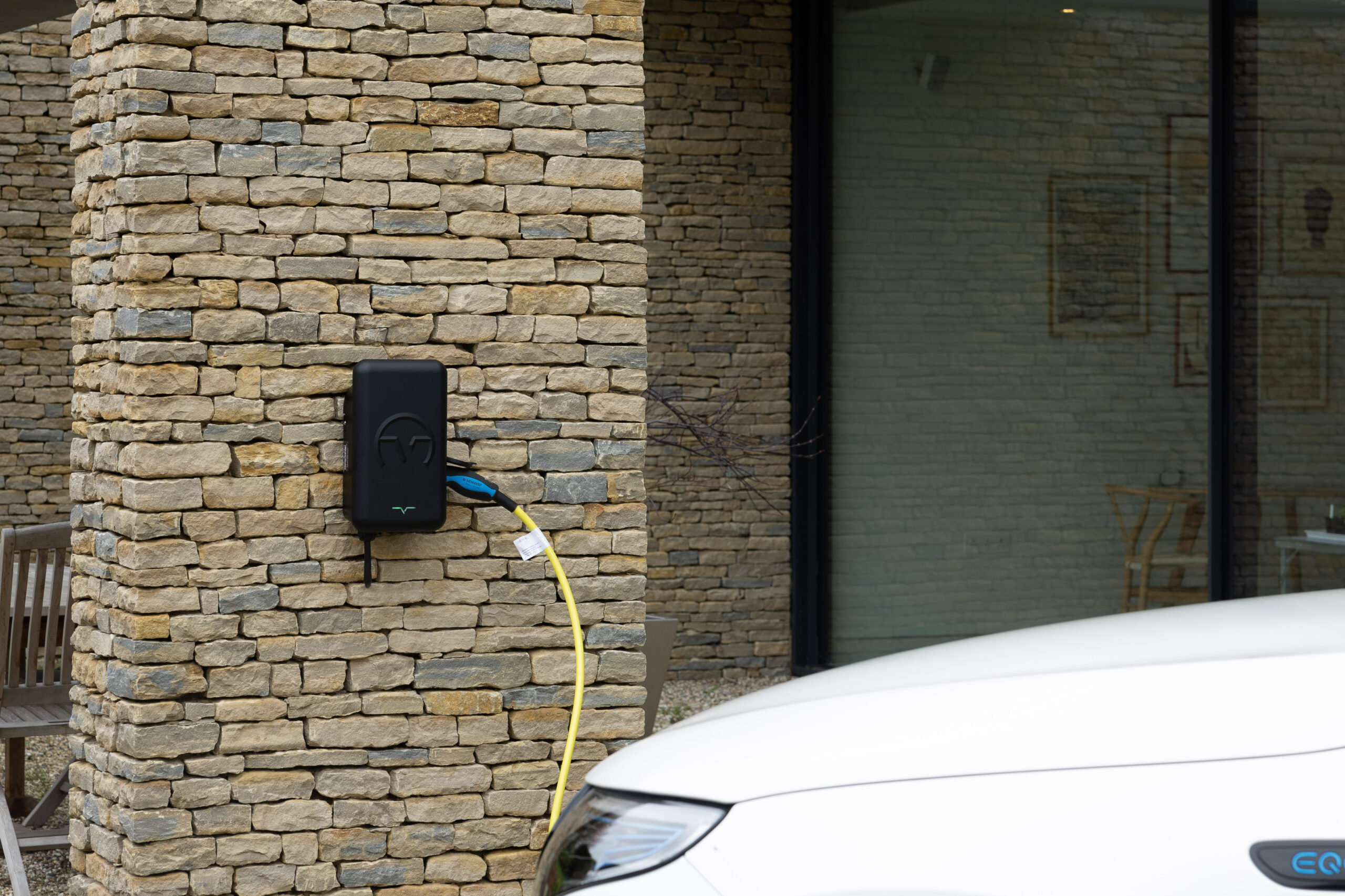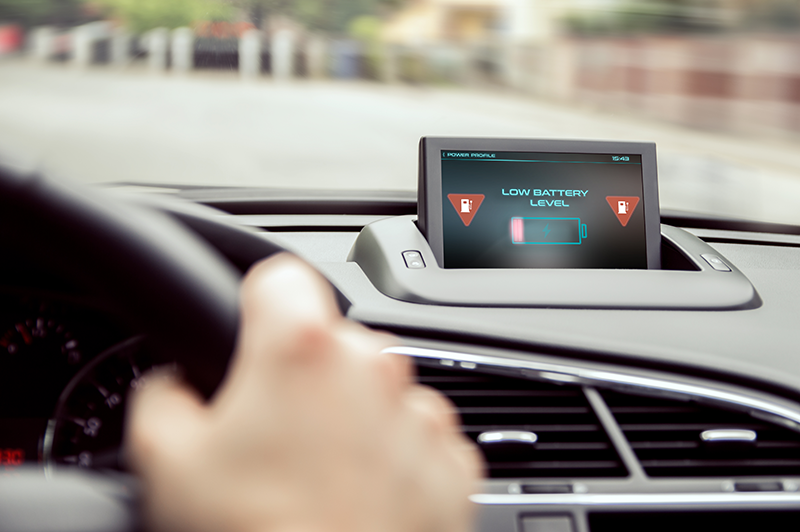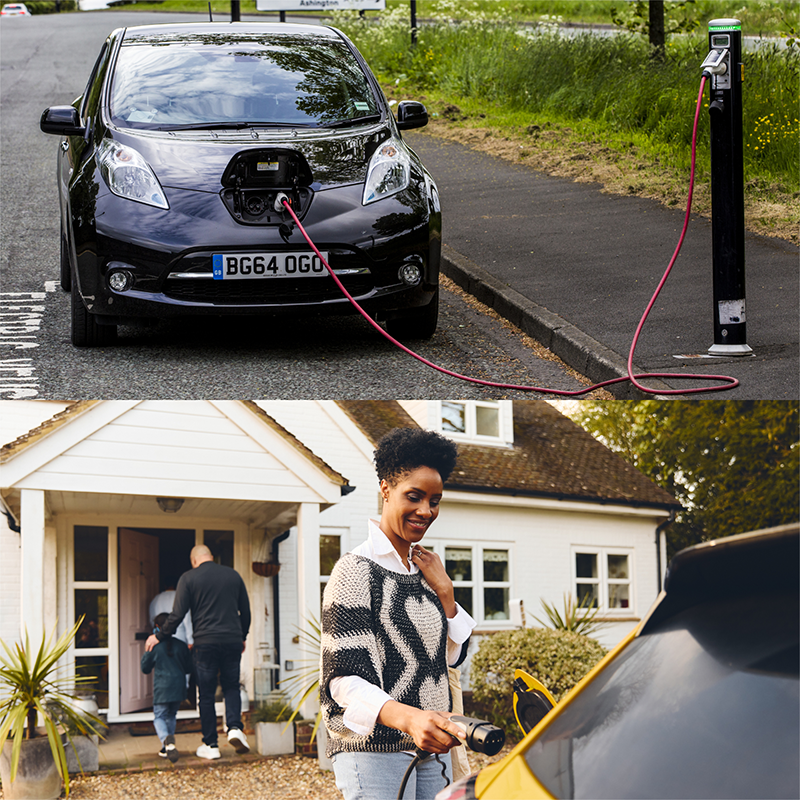
Preparing for an EV Charger installation – what you need to know
27 February 2024
Say goodbye to EV range anxiety and hello to a long battery life
29 February 2024Public Charging Stations Vs Home EV Charging – Which is Better?
The popularity of electric vehicles (EVs) continues to rise in Britain. And along with it is the demand for public EV charging. According to the Society of Motor Manufacturers and Traders (SMMT), the popularity of electric cars of all kinds continues to rise in Britain.
Current figures show that sales for battery electric vehicles (BEVs) are growing at 21% year on year with plug-in hybrids (PHEVs) registrations having risen to 31%. And it’s not just new EVs that are on UK motorists’ shopping lists—SMMT’s data shows that the second-hand car market has nearly doubled year-on-year too.
Yet while drivers may be making the switch from diesel and petrol cars to the more eco-friendly EVs, whether BEVs or PHEVs, many still want service as usual when it comes to powering up their cars. The reliance on petrol stations has now switched to a reliance on public electric charging points, leading to a growth in on-street, en-route, and destination EV charging stations.
However, the UK government has failed to meet its own targets for public charging, and the industry is calling out for more action. But while there is an obvious need for accessible public charging points, are these devices the best option for customers in terms of cost, convenience and control?
For most electric car owners, being able to charge their vehicles from the comfort of their own homes makes much more sense.
Plus using public charging stations comes with an immediate price tag for the operating service, while a home car charger means you only pay for the electricity you use.
However, it’s the upfront cost involved in EV charger installation that is often the factor that prompts folk to put it on the long finger.
So, with pros and cons on both sides, we look at public charging vs. EV home charging to help you decide which is the better option for you.
EV Charging Cost
After buying an electric vehicle, many hesitate to spend more cash for a home car charger.
After all, if you can just rock up to one of the public charging stations found in places such as shopping centres, commercial blocks, and along major motorways, what’s the problem?
On the face of it, there’s no problem.
Having access to public charging stations when you’re travelling long distances or need an emergency top-up while on the go is essential.
However, if this is going to be your only mode of charging, then you will find it much more expensive in the long run to keep your car on the road than if you were plugging in at home.
Cost to Charge Electric Car at Home
From 1 January 2024, the standard unit price of electricity in the UK was set at 28.62p per kWh (kWh being the electric equivalent of a litre of fuel).
For a typical EV with a 60 kilowatt-hour (kWh) battery that means when using this standard rate, the average cost per mile would clock up at just under 9p.
Think that’s cheap? Well, hold onto your purse strings! With off-peak rates and competitive tariffs being offered by numerous energy suppliers, the cost to charge your EV at home can plunge to as little as 3.2p per mile according to independent tests conducted by Which? Magazine.
In addition, once your home charge installation is set up, you only pay the same price you would for any household electricity usage—In other words, there are no EV-related “extra” charges.
Cost to Charge Electric Car at Public Charging Station
On the other hand, recent data released through the Zapmap Price Index, highlighted that not only did the price to charge an electric car on the public charging network increase by 11 per cent in 2023, but it was also three times the amount an individual would pay on the standard home tariff for the same period.
| Charger Type | Rapid/Ultra Rapid (Public) | Slow/Fast (Public) | Home |
| Dec 2023 | 81p | 55p | 27p* |
*Figure from Ofgem. Price rounded up to nearest pound.
Of course, there are reasons for these higher costs. But before we do a quick dive into those, let’s look at the different types of public charging stations available to EV drivers.
Currently, there are over 55,000 public electric vehicle charging devices installed across the country. These are divided into four types of stations catering to different circumstances and offering either slow, fast or rapid charging, each with varying price tags attached.
The different stations are:
- Destination charging stations
- On-street charging devices
- Other (i.e. semi-private and commercial charging stations)
- En-route/motorway charging stations
Destination EV Charging Stations
Destination-based public chargers account for 45 per cent of all of Britain’s current public electric car stations.
The name comes from the fact that they can be found at specific destination locations such as hotels, restaurants, hospitals, shopping centres and other places. That means you can charge your vehicle while booking in, eating out, visiting ill loved ones, or doing your weekly shopping.
Destination charging stations offer a mix of rapid, fast and slow charging, with slower charging times generally the more affordable. That said, even at a slow rate, recharging a typical electric car with a 60kWh battery will still cost you, on average, 17p per mile.
Keep in mind too that public charging prices can increase or drop depending on whether you’re plugging in during high peak or off-peak times.
On-Street EV Chargers
On-street charging devices are found in residential areas and allow people who live in the area to charge their EVs while parked near their homes.
You can make use of a pay-as-you-go system for a fast charge, but it will cost. Typically, you’ll have to stump up 40p per kWh standard time and 37p off-peak (midnight to 7 am), along with a 35p roaming network connection fee each time you plug in.
En-route
En-route charging stations are also known as rapid charging stations as they offer the fastest charging available. Whether using a dedicated app or paying as you go, EVs can be fully charged at these points in as little as 30 minutes to an hour.
They’re typically located off main roads and motorways and are ideal for topping up on long trips. But you’ll pay for the privilege. The price to charge an electric car on one of the top 10 rapid charging networks in February 2024 varied between 60p per kWh to a whopping 85p per kWh.
Reasons Behind High Costs of Public EV Charging Stations
So why is it much more expensive to recharge your electric car once you step outside your home?
Primarily it’s down to ongoing maintenance and service that charging station companies have to pay out, though the cost of infrastructure development (i.e. all the additional utilities and equipment along with the chargers themselves), also gets a look in.
In addition, motorists are charged VAT at 20 per cent rather than the 5 per cent rate domestic electricity users must pay.
Convenience
Of course, cost isn’t the only factor when it comes to choosing between public or home EV chargers. Convenience is another important consideration.
Charging up your car while you’re out shopping or mid-journey certainly has advantages. And for city dwellers, being able to amp up their battery using on-street stations rather than heading off in search of a dedicated charging spot, can be a headache dodged.
Yet, even so, it’s hard to beat the convenience of a home EV charger where you can plug in overnight and wake up to the battery being fully charged—all without having to change out of your jammies!
Control
Add to this the fact that with an EV home charger, you have complete control over when, where and how much you charge your electric car, and straight away you’re alleviating one of the major stress points about public chargers—the possibility that your nearest located one (if you do have a near location) may not be working.
According to earlier figures released by Zap-Map, the UK’s primary EV charging points app, approximately 10 per cent of the public charging network is unavailable at any given time. This may be due to maintenance, faulty devices or other reasons, but it’s a concern for all EV motorists reliant on public charging stations.
The British government has pledged to ensure that there will be 300,000 public chargers available by 2030, which may increase the number of charge points in proximity to any one driver.
For many it can’t come soon enough; In a recent survey of 1,000 drivers, EVA England discovered that English motorists have a pretty negative view of their experiences at public EV charging stations, rating them 2.16 out of 5.
Final words
Whether you use a public or an EV home charger may come down to personal choice and circumstances.
However, the stats do show that when it comes to cost, convenience and control, an at-home EV charging station ticks all the right boxes.
Sure, an EV charger installation is a large one-time expense. But it’s only a one-time expense.
And if you’re charging consistently at home as opposed to using public EV charging points, you’re saving in the region of £500 per year, which means you’ll make your money back in approximately two years.
That said, it is important to have access to public charging stations so that you can use them in times of necessity. But relying on them fully won’t just be bad for your pocket, it’ll cost you in time and comfort too.
If you’re thinking about installing an EV charger at home, Powerverse offers simple, smart solutions that help you reduce your energy bills—and ensure you can charge your car every day your way, easily and stress-free.
The rigorously-tested, solar-ready VCHRGD we sell is approved by the Office for Zero Emission Vehicles and comes with a three-year warranty. Find out more here.
About Powerverse
We’re industry experts in home energy management. Our easy-to-use app is built for your future electric home. It will effortlessly sync your solar, battery, heat pump, EV charger and more, helping you cut costs and your carbon footprint on your way to becoming energy-independent. Curious to know more? Talk to one of our experts.

